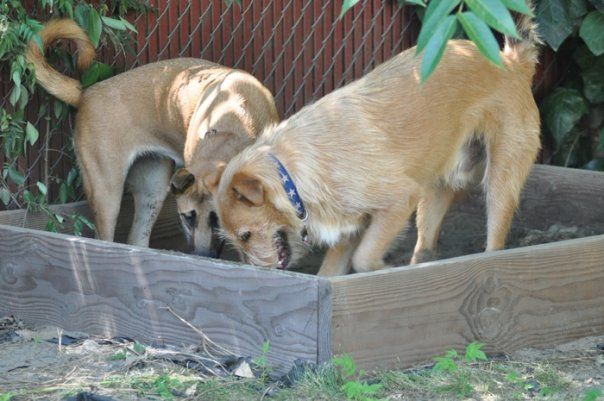
When it comes to natural dog behavior, for many dogs, digging is on the list of favorite pastimes. Unfortunately, for dogs who share their lives with humans, digging is often considered a “no go” activity.
Dogs dig holes in the dirt for a variety of reasons:
- To explore the environment
- To relieve boredom and/or stress
- To escape an enclosed area
- To create a cool spot to rest
- In pursuit of ground-dwelling critters.
- It’s fun!
Prevent digging in the first place
The best way to address digging is to prevent it altogether. Avoid leaving your dog outside unsupervised until you’re confident he can self-entertain without digging. Examine your yard to identify the areas with prime digging potential, such as spots with loose dirt or gopher mounds or damp areas that invite digging. Of course, some dogs will decide to dig anywhere, but reducing the temptation makes it easier to direct your dog’s attention to more desirable behaviors.
If you must leave your digging-prone dog unsupervised in the yard, employ management to help prevent the rehearsal of the unwanted behavior. Consider a safe enclosure like a dog run or use a sturdy exercise pen set up to restrict access to areas where your dog likes to dig. It won’t be forever – just while she’s learning!
Provide your dog with enrichment
It’s also wise to take an honest inventory of your dog’s overall enrichment. Does your dog leave the house and/or yard every day for a walk? Is it always the same route? Do you mix things up with some training while you walk? If your dog is confident in public, does he ever accompany you on errands to new (dog-friendly) places? Dogs often dig because they’re bored. Be honest about what else he has on his agenda in a typical week and see how you might spice things up a bit.
How to stop a dog’s established habit of digging holes
Here are some things to try if your dog has already made a habit of nuisance digging:
Make a Digging Pit – Fill a kid’s sandbox or plastic wading pool with sand or dirt. (Sand makes less of a mess than dirt.) Bury your dog’s favorite toys. Excitedly show him the pit and help him uncover the prizes. Remember to replenish the toys hidden within the pit and repeat the process of helping him uncover the treasures. As he gets better, the “hides” can become smaller and harder to find.
Digging random holes? Try replacing most of the dirt in the hole, collect some of your dog’s feces to add atop the replaced dirt, and top it off with the rest of the dirt. For some dogs, digging for fun – and finding feces – takes the fun right out of digging! You’ll probably need to do this a few times as your dog experiments with digging new holes, but for many dogs, the consistent experience of uncovering feces will help them rethink their backyard behavior – especially when paired with your efforts to give them better things to do.
Can’t bring yourself to rig your dog’s favorite holes with poop? Use the same technique but instead of poop, use a piece of chicken wire cut to fit the surface area of the mostly filled hole.
What to do if your dog digs under the fence
For fence diggers, we recommend digging a trough along the fence and lining it with heavy, upright stone pavers. You can also attach an 18-inch-tall trip of chicken wire to the bottom of a wooden fence and bury about it at least a foot deep.
We recently discovered a product called Dig Defence, a galvanized steel product resembling a giant comb, and is designed to be pounded into the ground next to and under a fence, providing an underground barrier for digging. It comes in 36-inch lengths with a range of “teeth” lengths and distances between teeth (smaller gaps for smaller dogs, and wider gaps for bigger dogs) and is effective at preventing a dog from escaping through a hole he’s dug next to a fence. It would be cost-prohibitive to line your entire fence with these panels, but if your dog keeps digging in just one area, this might be the solution. See digdefence.com.
Most importantly, remember that behavior doesn’t change overnight. You’ll need to be consistent in your efforts to reduce your dog’s digging via a combination of training and management, and you should expect it to take up to a few months of consistency before you see significant improvement. Don’t dig your own hole deeper by giving up too soon!





My dog constantly and aggressively digs on sheets, comforters, couches. She is not invited to my best friend’s anymore because she ruined one of her beautiful leather (expensive) couch cushion. I left her unattended maybe 15 minutes while I went outside to check on the sprinkler system. She has also dug holes in sheets. Any ideas?